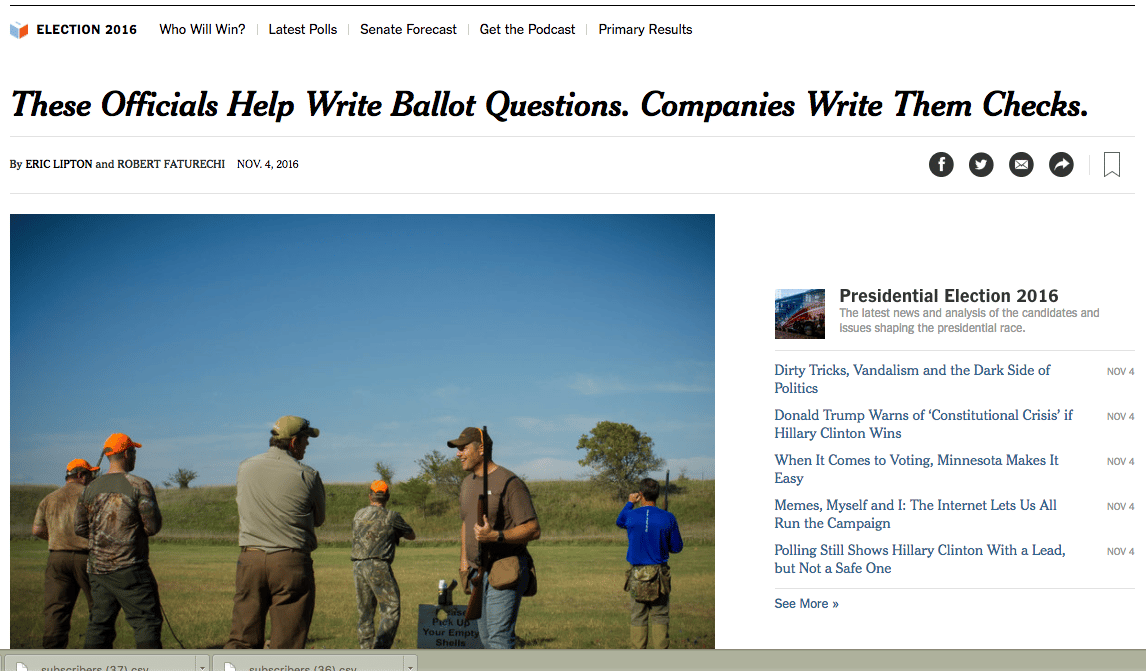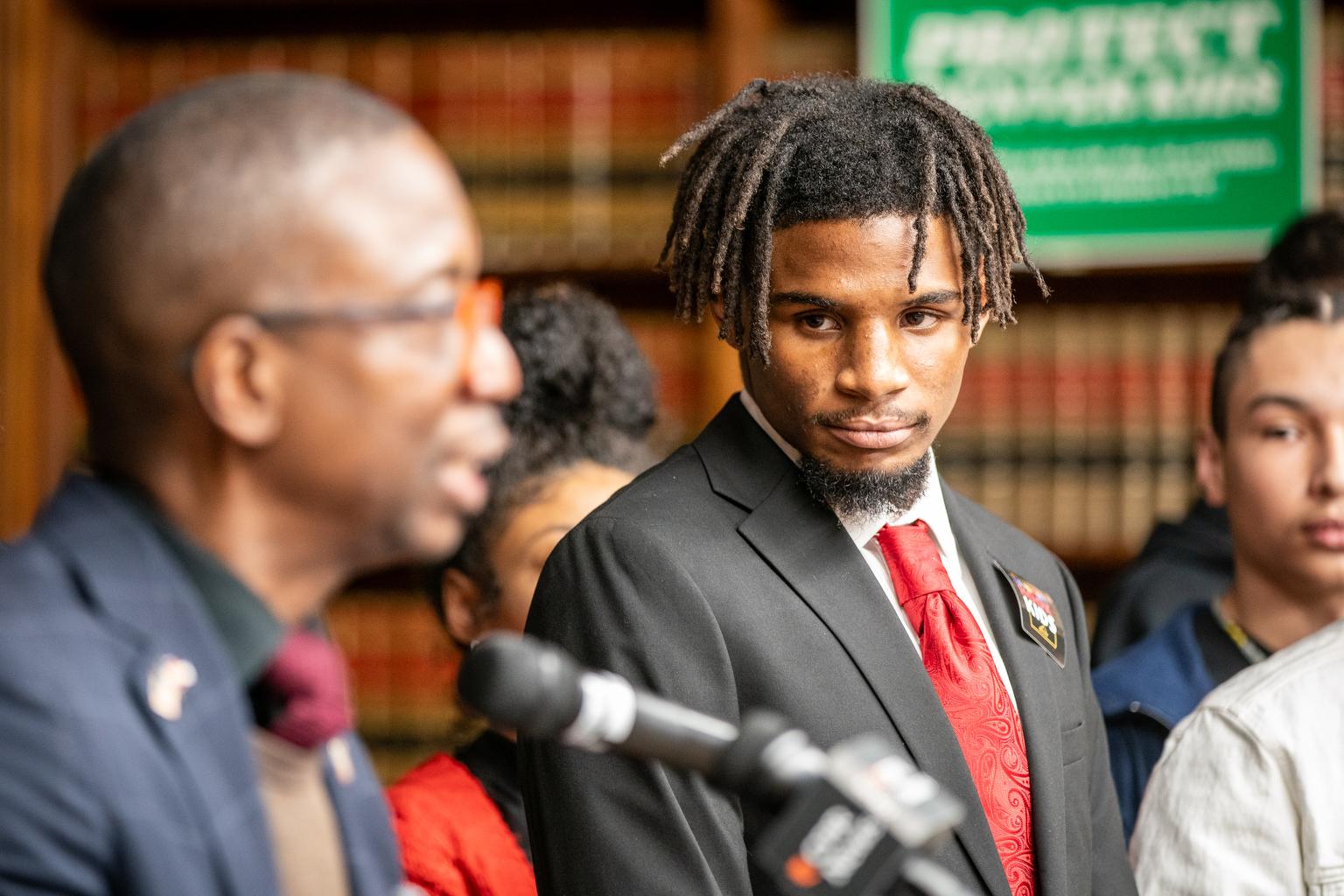The Republican Secretaries of State Committee organized meetings between its members -- including Colorado Secretary of State Wayne Williams -- and industry representatives who had concerns about ballot measures coming forward in the states whose elections those secretaries oversee, a joint investigation of the New York Times and Pro Publica found.
Meeting agendas posted online by the New York Times show that the National Restaurant Association wanted to talk to the secretaries of state about measures that would raise the minimum wage and Reynolds American, the nation's second largest tobacco company, wanted to raise concerns about tobacco taxes.
Colorado voters this year are deciding on Amendment 70, which would raise the minimum wage to $12 by 2020, and Amendment 72, which would raise cigarette taxes, along with seven other statewide ballot measures.
The headline the New York Times gives its piece is "These Officials Help Write Ballot Questions. Companies Write Them Checks." The article describes changes to a gun control measure in Nevada that proponents fear makes it a tougher sell with voters and describes these meetings as a new avenue for lobbyists to try to shape public policy.
"The targeting of secretaries of state with campaign donations, corporate-funded weekend outings and secret meetings with industry lobbyists reflects an intense focus on often overlooked ballot questions, which the secretaries frequently help write.
"The ballot initiatives are meant to give voters a direct voice on policy issues such as the minimum wage and the environment. But corporate and other special interests are doing their best to build close ties with the secretaries because a difference of even a few words on a ballot measure can have an enormous impact on the outcome."
Colorado Secretary of State spokeswoman Lynn Bartels rejects the premise embedded in the headline, at least when it comes to Colorado. The secretary of state plays no role in writing ballot language, she said.
Proponents write initiative language and then a title board made up of the state attorney general, the deputy secretary of state, which is not an elected position, and members of the Colorado General Assembly's Office of Legislative Legal Services, who are nonpartisan government employees, go over the language to make sure its clear, that the measure deals only with one issue, as required by law, and that it avoids "catch phrases," said Deputy Secretary of State Suzanne Staiert.
One of the more contentious issues at title board this year involved Proposition 106, which would allow doctors to prescribe lethal doses of barbiturates to terminally ill people. Proponents called it "end of life options" while opponents wanted "physician-assisted suicide." The title board settled on "medical aid in dying" as the most neutral option.
These meetings are public, which people from both sides making their case, and the decisions can be appealed -- and often are -- to the Colorado Supreme Court.
Staeirt told me she has never known a secretary of state, not Williams, not his predecessor Scott Gessler, to interfere with title board in any way. She described a "firewall" between the secretary of state and title board.
Bartels, who covered Colorado politics for years for the Denver Post, said she doesn't consider it unusual that lobbyists would meet with elected officials.
Williams told the New York Times: "When you are trying to raise money, you try to work with people who have an interest in the subjects."
"I will meet with anybody on any side of the subject at any time," he added.
Representatives of both the minimum wage measure and the cigarette tax campaign said they felt they were treated fairly and professionally by the staff of the Secretary of State's Office, but they were still concerned to learn about the private meetings.
"I don't have any red flags in terms of the process here, but it was certainly concerning to read about it," said Patricia Kupfer, campaign manager for Colorado Families for a Fair Wage, the pro-minimum wage increase group. "It's not that surprising that they would stoop to this level that they would try to influence our state's top elected officials... What is the goal of the restaurant association in having a meeting like this? I leave that to the speculation of voters and the general public."
Myung Kim, a spokeswoman for Yes on 72, also felt like the title board process was fair. However, when she read about Williams' meetings with tobacco company reps, she thought of the times that Williams has spoken publicly against Amendment 72, "which is troubling given his role as the state's top election official," Kim said in an email.
"The power of the tobacco industry lobby is well documented and Big Tobacco's power in this election is unprecedented. Philip Morris has spent $17 million on a misleading advertising blitz to defeat Amendment 72. That's more than the Clinton and Trump campaigns have spent in Colorado combined."
Bartels said Williams declines requests to join campaigns on any ballot measure, but if asked his opinion, he'll give it. He also opposes Amendment 69, which would create a single-payer healthcare system, and Propositions 107 and 108, which create a presidential primary and allow unaffiliated voters to participate in that and in regular primaries.
While the New York Times and Pro Publica didn't identify any junkets hosted by liberal groups, they did find evidence labor unions, environmental groups and others have targeted Republican secretaries of state under the belief Democratic secretaries would be more receptive to their concerns, particularly around making it easier to vote.













